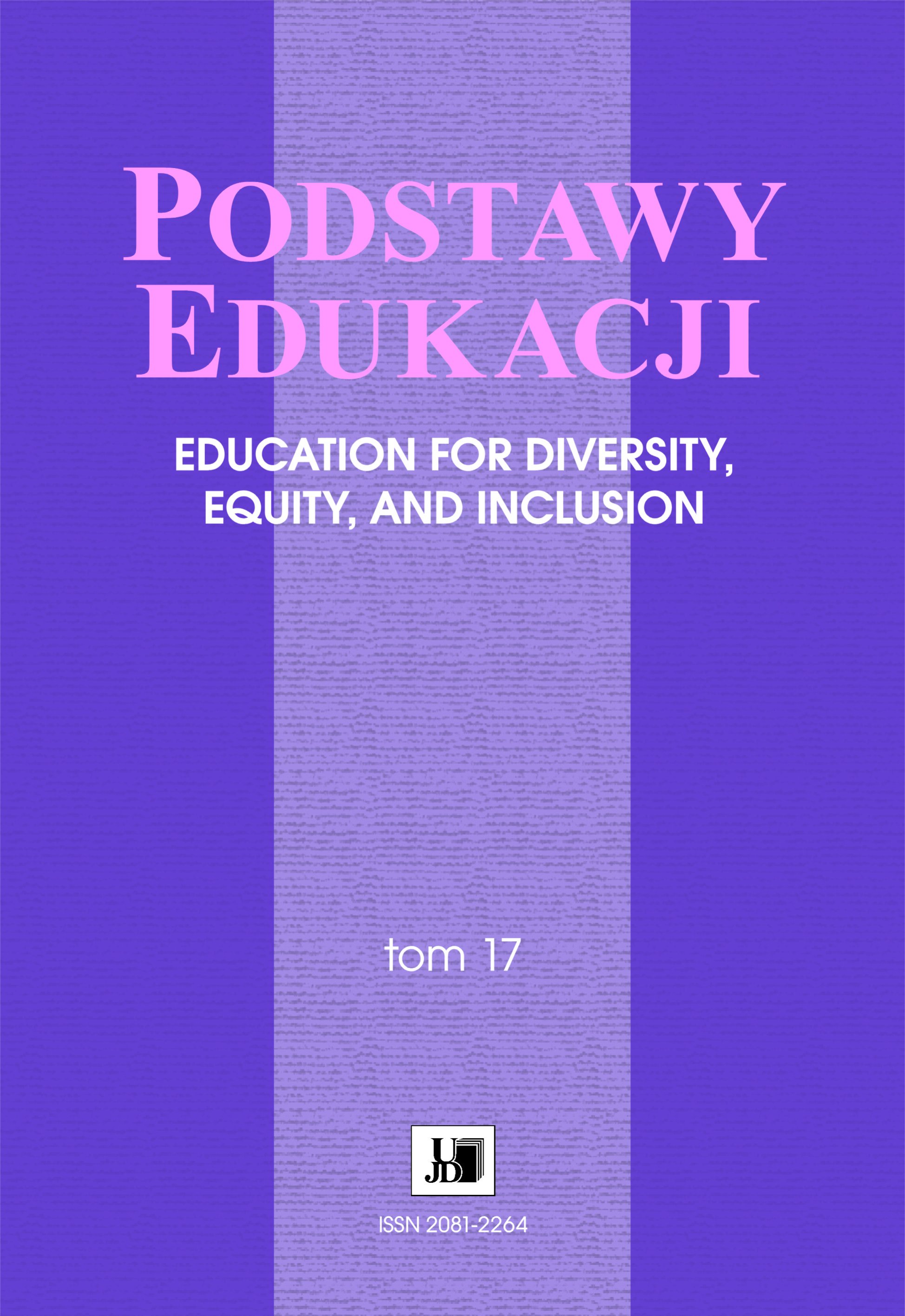Abstract
The 2022 PISA results show a high level of functional illiteracy among Romanian students: 42% of Romanian students did not reach the second level in literacy tests. (OECD, 2023) Studies identified in the literature indicate the great importance that emergent literacy skills have on the future acquisitions that students achieve in the educational process, especially for students with low socio-economic status. For a teacher, to facilitate the development of these competences, it is necessary to apply appropriate methods and strategies adapted to the particularities of the pupils. Given these considerations, we set out in this study to investigate the impact of an intervention aimed at emergent literacy on first grade students from disadvantaged socio-economic backgrounds. The research carried out is a quantitative quasi-experiment. The research sample consisted of 15 first graders from disadvantaged socio-economic backgrounds, some of them bilingual and not enrolled in kindergarten. For data collection, a literacy assessment booklet was used as a literacy assessment instrument, used as a pre-test and post-test. In between the two tests there were didactic activities in which the researchers worked with each participant, on an individualized basis, on all the essential aspects related to emergent literacy. The findings of this study show that the pupils who participated in the remedial activities aimed at emergent literacy showed, at the end of the intervention, an improvement in literacy competence on all the dimensions targeted by the research instrument.
References
Apel, K., Lawrence, J. (2011). Contributions of morphological awareness skills to Word-Level Reading and Spelling in First-Grade children with and without Speech Sound Disorder. Journal of Speech, Language, and Hearing Research, 54(5), 1312–1327. https://doi.org/10.1044/1092-4388(2011/10-0115.
Baker, E.H. (2014). Socioeconomic status, definition. The Wiley Blackwell Encyclopedia of Health, Illness, Behavior, and Society, 2210–2214. https://doi.org/10.1002/9781118410868.wbehibs395.
Balea, B., Kovacs, M., Temple, C. (2023). Kick-Start Literacy for All. Comparative Results from Romanian Preparatory Grade Classrooms. Revista de Pedagogie [Journal of Pedagogy], 71(1), 149–169. https://doi.org/10.26755/revped/2023.1/149.
Chambrè, S.J., Ehri, L.C., Ness, M. (2019). Phonological decoding enhances orthographic facilitation of vocabulary learning in first graders. Reading & Writing, 33(5), 1133–1162. https://doi.org/10.1007/s11145-019-09997-w.
Cunningham, A.E., Stanovich, K.E. (1997). Early reading acquisition and its relation to reading experience and ability 10 years later. Developmental Psychology, 33(6), 934–945. https://doi.org/10.1037/0012-1649.33.6.934.
Dodd, B., Carr, A. (2003). Young Children’s Letter-Sound knowledge. Language, Speech & Hearing Services in Schools, 34(2), 128–137. https://doi.org/10.1044/0161-1461(2003/011.
Dooley, C.M., Matthews, M.W. (2009). Emergent comprehension: Understanding comprehension development among young literacy learners. Journal of Early Childhood Literacy, 9(3), 269–294. https://doi.org/10.1177/1468798409345110.
Dolean, D.D., Lervåg, A., Visu-Petra, L., Melby-Lervåg, M. (2021). Language skills, and not executive functions, predict the development of reading comprehension of early readers: evidence from an orthographically transparent language. Reading & Writing, 34(6), 1491–1512. https://doi.org/10.1007/s11145-020-10107-4.
Dolean, D., Melby-Lervåg, M., Tincas, I., Damsa, C., Lervåg, A. (2019). Achievement gap: Socioeconomic status affects reading development beyond language and cognition in children facing poverty. Learning and Instruction, 63, 101218. https://doi.org/10.1016/j.learninstruc.2019.101218.
Duke, N.K., Cartwright, K.B. (2021). The science of reading progresses: communicating advances beyond the simple view of reading. Reading Research Quarterly, 56(S1). https://doi.org/10.1002/rrq.411.
Duke, N.K., Ward, A.E., Pearson, P.D. (2021). The science of reading comprehension instruction. The Reading Teacher, 74(6), 663–672. https://doi.org/10.1002/trtr.1993.
Ehri, L.C. (2020). The Science of Learning to Read Words: A case for Systematic Phonics instruction. Reading Research Quarterly, 55(S1). https://doi.org/10.1002/rrq.334.
Ehri, L.C. (2022). What teachers need to know and do to teach letter-sounds, phonemic awareness, word reading, and phonics. The Reading Teacher, 76(1), 53–61. https://doi.org/10.1002/trtr.2095.
Esmaeeli, Z., Kyle, F.E., & Lundetræ, K. (2019). Contribution of family risk, emergent literacy and environmental protective factors in children’s reading difficulties at the end of second-grade. Reading and Writing, 32(9), 2375-2399. https://doi.org/10.1007/s11145-019-09948-5.
Høien, T., Lundberg, I., Stanovich, K.E., Bjaalid, I.K. (1995). Components of phonological awareness. Reading & writing, 7(2), 171–188. https://doi.org/10.1007/bf01027184.
Kargin, T., Güldenoğlu, B., Gengeç, H. (2023). The Role of Early Literacy Skills in Beginning to Read in Turkish: Longitudinal Findings from First Graders. Participatory Educational Research, 10(2), 26–42. https://doi.org/10.17275/per.23.27.10.2.
Kim, Y., Park, C.H., Wagner, R.K. (2013). Is oral/text reading fluency a "bridge" to reading comprehension? Reading & Writing, 27(1), 79–99. https://doi.org/10.1007/s11145-013-9434-7.
Kuhn, M.R., Schwanenflugel, P.J., Meisinger, E.B. (2010). Aligning Theory and assessment of reading fluency: automaticity, prosody, and Definitions of fluency. Reading Research Quarterly, 45(2), 230–251. https://doi.org/10.1598/rrq.45.2.4.
Lonigan, C.J., Purpura, D.J., Wilson, S.B., Walker, P.M., Clancy-Menchetti, J. (2013). Evaluating the components of an emergent literacy intervention for preschool children at risk for reading difficulties. Journal of Experimental Child Psychology, 114(1), 111–130. https://doi.org/10.1016/j.jecp.2012.08.010.
National Reading Panel (US), National Institute of Child Health, Human Development (US). (2000). Report of the National Reading Panel: Teaching children to read: An evidence-based assessment of the scientific research literature on reading and its implications for reading instruction: Reports of the subgroups. National Institute of Child Health and Human Development, National Institutes of Health.
Reese, K. (2008). The effects of instruction and discourse combining Shared Book and Language Experience approaches with at-risk first graders. Oakland University.
Schmitt, M.C., Gregory, A.E. (2005). The Impact of an Early Literacy Intervention: Where Are the Children Now?. Literacy Teaching and Learning, 10(1), 1–20.
Stanovich, K.E. (2009). Matthew Effects in Reading: Some consequences of individual differences in the acquisition of literacy. Journal of Education, 189 (1–2), 23–55. https://doi.org/10.1177/0022057409189001-204.
Temple, Ch., Temple, C. (2023). Caiet de evaluare a literației emergente [Emerging literacy assessment workbook].
Vellutino, F.R., Scanlon, D.M., Zhang, H., Schatschneider, C. (2007). Using response to kindergarten and first grade intervention to identify children at-risk for long-term reading difficulties. Reading & Writing, 21(4), 437–480. https://doi.org/10.1007/s11145-007-9098-2.
Whitehurst, G.J., Lonigan, C.J. (1998). Child Development and emergent Literacy. Child Development, 69(3), 848–872. https://doi.org/10.1111/j.1467-8624.1998.tb06247.x.
Wilson, K.M., Trainin, G. (2007). First-Grade students’ motivation and achievement for reading, writing, and spelling. Reading Psychology, 28(3), 257–282. https://doi.org/10.1080/02702710601186464.
OECD. (2023). PISA 2022 Results: Factsheets. Retrieved from https://www.oecd.org/publication/pisa-2022-results/country-notes/romania-cfe329e8/.

This work is licensed under a Creative Commons Attribution 4.0 International License.
Copyright (c) 2024 Cosmina Simona Lungoci, Flavia Bianca Barboni , Mihaela Mihalache, Maria Vâlsan
